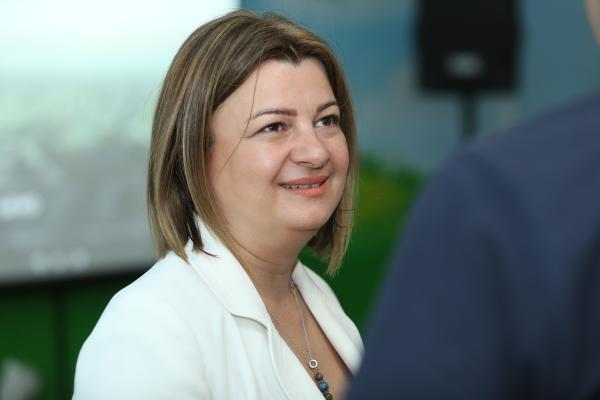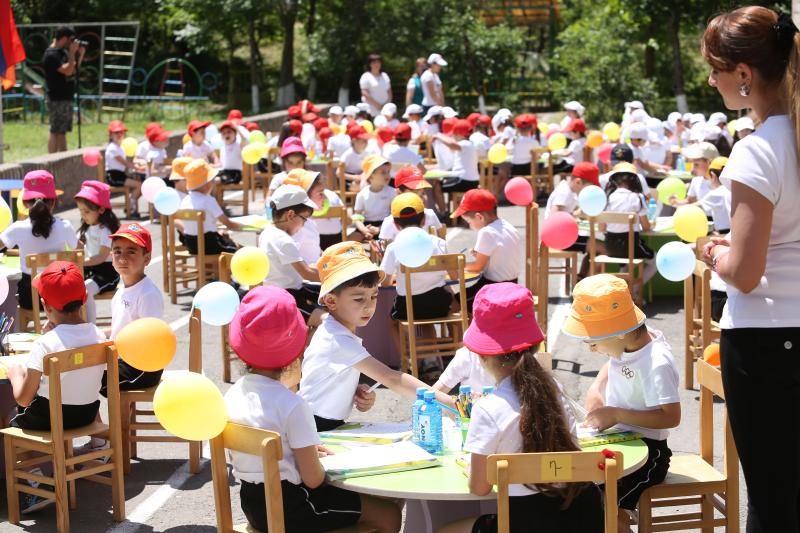Yerevan schools are dilapidated, but a big renovation grant from European donors for 150 Armenia kindergartens will make them more energy efficient—and safer for the children

Armine Hayrapetyan, director of a Yerevan kindergarten, says children’s health is the main reason for the renovations.
Falling plaster, peeling paint, cracked walls, chipped facades, drafty windows, leaky roofs, faulty heating systems. The list of problems goes on and on for Armenian kindergartens, and the children suffer the most.
The decaying school buildings in the capital of Armenia make life uncomfortable for teachers and support staff, but it is dangerous for the youngsters in the classes each day.
“Children’s health and safety is paramount,” says Armine Hayrapetyan, the director of a kindergarten in Yerevan.
Children are the most at risk
Daily life for educators and kids will improve soon. A reconstruction project that runs until 2020 is rehabiltating nearly 150 kindergartens in Yerevan to make them energy efficient and resilient to possible seismic activity and the big temperature swings from summer to winter. Dangerous cracks will be fixed and walls reinforced, insulation will be added to roofs, new heaters will be installed as well as LED lighting and solar energy systems, and the interiors will get new plaster and new paint.
“Renovation of just our doors and windows is extremely important, as children are more susceptible to disease,” says Anoush Davtyan, whose four-year-old son, Karen Apresyan, is in kindergarten No. 110 in Yerevan.
The work is supported by a EUR 5 million grant from the Eastern Europe Energy Efficiency and Environment Partnership. The European Investment Bank helps administer this fund, and the money comes from the European Union and other donors to help energy projects in Ukraine, Moldova, Georgia, Armenia, Azerbaijan and Belarus. The fund shows countries how to save money on energy use, reduce carbon dioxide emissions and protect the environment.
Cutting emissions and expenses
The grant for the kindergartens, signed in June 2018, comes on top of a EUR 7 million EIB loan signed in 2017 to help Yerevan make energy-efficiency improvements in public buildings across the capital.

The Yerevan kindergarten project will make buildings more resilient to the big temperature changes between summer and winter.
The Yerevan kindergarten project will reduce carbon dioxide emissions by 5,502 tonnes annually. The city will lower its energy bill by more than EUR 1 million per year. The project will make life safer for 34,500 children, teachers and other staff members.
The renovations empower women in Armenia. Nicer schools make parents more comfortable about letting their children go to kindergarten. With the kids in school, women have extra time to pursue their professional goals. A new EIB policy embeds gender equality in all projects. Most of the employees in the Yerevan kindergartens are women.
The renovations are a pioneering project in Armenia. The hope is that other cities and regions will see the success of this operation and plan more public rehabilitation projects, and that other investors will get involved.
Davtyan, the school parent, says the project would not have happened without the EU bank’s support.
“That’s why the energy efficiency programme by the European Investment Bank is extremely important to us,” she says. “The kindergartens will be renewed and our lives will be safer.”
